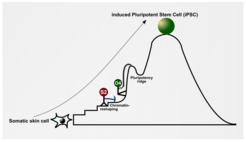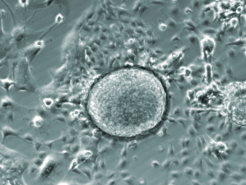China’s Max Planck Center scientists unravel initial steps of iPS technology
Sox2 opens up the DNA, Oct4 takes the lead in pluripotency
Within the vibrant environment of the GIBH - Max Planck Center for Regenerative Biomedicine, a team of scientists revealed the initial molecular mechanisms of factor-induced reprogramming of differentiated cells into pluripotent cells. This technique of reprogramming to produce so-called induced pluripotent stem (iPS) cells was first published in 2006 and was awarded the Nobel Prize in Physiology or Medicine in 2012. However, the exact molecular mechanisms remained a mystery. In their current studies, published in Nature Communications, the Max Planck Center scientists surprisingly showed that the transcription factor Sox2, rather than Oct4, is the initial key factor in reprogramming; Oct4 gains importance in later stages during reprogramming. The insights can make iPS-reprogramming of body cells more quickly, efficiently and faithfully – a prerequisite for such cells to be used for example in treating disease caused by cellular damages.

Try to imagine a ball rolling down the hill, that’s how cells are destined to differentiate within us. Now, try to imagine a ball rolling up the hill, that’s what the ‘Yamanaka factors’ (Oct4-Sox2-Klf4-Myc aka OSKM) are destined to do when over-expressed in differentiated cells in a dish.
The large green ball on top of the hill depicts a colony of induced pluripotent stem cells that originated from the forced expression of OSK in mouse embryonic fibroblast (somatic skin) cells. Any other cell around this colony could have also been ‘rolled up’ to the top of hill, but failed for some reason.
Ever since the discovery of factor-induced reprogramming, many laboratories have worked on unraveling its mechanisms. Whereas some laboratories classified Oct4, Sox2, Klf4 as pioneer factor others showed that these are not pioneer factors and mainly bind open chromatin. Thus, the topic remained controversial.
A Max Planck Center team, led by graduate student Vikas Malik and his mentor Ralf Jauch, focused on the regulatory proteins called Oct4 and Sox2 that were known to play dominant roles in the reprogramming process: Oct4 and Sox2 are long known to work together to regulate genes required for self-renewal and pluripotency of stem cells. The edge of their work, however, was that they used a modified version of Oct4 that does not interact with Sox2.
“We compared how the mutant and wildtype Oct4 in conjunction with Sox2 bind, crop out and turn on genes with factors that cannot make pluripotent cells”, explains Vikas Malik. “We made some very surprising discoveries”, says Vikas Malik. “First of all, we discovered that Sox2 rather than Oct4 is the initiating key factor in reprogramming: Sox2 ‘attacks’ pluripotency genes that otherwise slumber in differentiated cells and opens them up – a pre-requisite for their later activation. Oct4 is not really important at this initial phase and rather plays the role of a replaceable assistant.”

Reprogramming in a dish
A colony of induced pluripotent stem cells (middle) that were reprogrammed from mouse embryonic fibroblast cells (shown around the colony)
Yet, the uniqueness of Oct4 becomes evident at later stages of reprogramming: “To eventually turn on the network of genes needed for a cell to become pluripotent, Sox2 and Oct4 intermingle tightly and do the job together”, says Vikas Malik. Once cells have become pluripotent, Oct4 takes the lead and its tight association with Sox2 becomes less critical.
“Our insights will provide inspirations to tinker with Sox2, Oct4, and related factors to interconvert the state of body cells more quickly, efficiently and faithfully so these programmed can eventually be used to treat disease caused by cellular damages”, says Ralf Jauch.
The work was an international effort by scientists from Guangzhou in Mainland China, Hong Kong, the United States, and Germany and was conducted within the vibrant environment of the GIBH - Max Planck Center for Regenerative Biomedicine.
“This publication is an excellent example of the benefits of Max Planck Centers”, says Ralf Jauch. He was Principal Investigator and Professor at the Guangzhou Institutes of Biomedicine and Health and has now moved to the School of Biomedical Science of the University of Hong Kong. “Without the uncomplicated cooperation with our partners from the Max Planck Institutes for Molecular Biomedicine and for Heart and Lung Research, we could not have accomplished these studies.”
About the Max Planck – GIBH Joint Center for Regenerative Biomedicine
Max Planck Centers (MPCs) are scientific cooperation programmes by the Max Planck Society which add a new quality to the scientific cooperations with top foreign partners in forward-looking research areas. The Max Planck Institutes involved and their international partners contribute their experiences and expertise, adding scientific value by combining complementary methods and knowledge. The GIBH - Max Planck Center for Regenerative Biomedicine started in 2016 and was the first Max Planck Center in China. In the year 2020, the GIBH - Max Planck Center for Regenerative Biomedicine will be the first MPC worldwide to have its own large laboratory.

